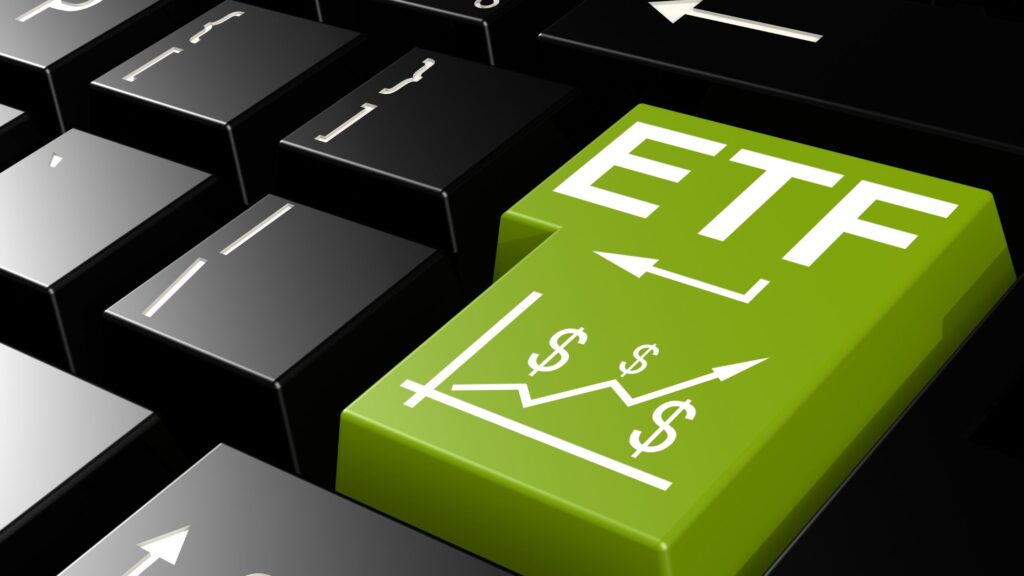Nigerian ETFs are showing a remarkable performance in 2025. They offer exciting opportunities for investors looking to earn passive income. Here’s the ones making Nigerians rich in 2025 and how to invest.

What Are ETFs and How Do They Work?
Exchange Traded Funds (ETFs) are exactly what their name suggests: funds that trade on stock exchanges, typically tracking a specific index, sector, or basket of assets. Think of an ETF as a pre-packaged investment bundle that gives you exposure to multiple stocks, bonds, or commodities through a single purchase.
Unlike actively managed funds where fund managers make investment decisions trying to beat the market, most ETFs are passively managed. This means they simply mirror the performance of their underlying index or benchmark. For example, if you buy an ETF tracking the NGX 30 Index, you’re essentially investing in the top 30 companies on the Nigerian Exchange in one transaction.
The beauty of ETFs lies in their simplicity and cost-effectiveness. They offer instant diversification, transparency and typically charge lower fees than actively managed funds. Studies consistently show that the average active fund manager underperforms the market once costs are factored in. And this makes ETFs an attractive option for cost-conscious investors.
Nigeria’s ETF Market: A Success Story
The Nigerian ETF market has been on a remarkable trajectory, with market capitalization growing from ₦12.49 billion at the start of the year to ₦14.44 billion as of June 20, 2025. According to recent data from the Securities and Exchange Commission (SEC), all twelve listed ETFs averaged an impressive 20.39% year-to-date performance, with eleven of them posting positive returns.
Top Performing Nigerian ETFs in 2025
Based on performance from January data through June 2025, here are the standout ETFs driving investor returns:
1. Vetiva S&P Nigeria Sovereign Bond ETF (VSPBONDETF) – +51.46%
Leading the pack with an outstanding 51.46% return, this ETF tracks the S&P Nigerian Sovereign Bond Index. It provides investors with exposure to the most liquid FGN Bond Securities. It’s an excellent option for those seeking fixed-income exposure with strong performance potential.
2. Vetiva Consumer Goods ETF (VETGOODS) – +46.51%
This ETF mirrors the NGX Consumer Goods Index and comprises the top 15 companies in the food, beverage and tobacco sectors. With Nigeria’s growing consumer market, this ETF has delivered impressive returns of 46.51%.
3. NewGold ETF (NEWGOLD) – +30%
For investors looking to diversify into commodities, NewGold ETF offers exposure to gold bullion and has returned 30% year-to-date. Originally launched in South Africa, it’s listed across multiple African exchanges, including Nigeria.
4. Lotus Halal ETF – +26.68%
This Sharia-compliant ETF tracks the NSE-Lotus Islamic Index, making it perfect for investors seeking ethical investment options that align with Islamic principles while delivering solid returns of 26.68%.
5. SIAML ETF 40 – +25.57%
The Stanbic IBTC Asset Management ETF tracks the NGX Pension Index, focusing on the top 40 companies eligible for pension fund investments, returning 25.57% to investors.
Other Notable Performers:
6. Vetiva Griffin 30 (VETGRIF30) – +17.02%
7. Stanbic IBTC ETF 30 – +15.40%
8. Vetiva Banking ETF (VETBANK) – +14.68%
9. Greenwich Asset Management Limited – +12.87%
10. Meristem Growth ETF – +12.87%
12. Meristem Value ETF – +2.51%
Where to Invest in ETFs
For Nigerian investors, ETFs can be purchased through various platforms that offer access to Nigerian stocks, such as Meritrade and other licensed stockbroking firms. Additionally, international investors have access to numerous global brokers offering ETF trading services.
According to recent broker ranking by BrokerChooser.com, top-rated platforms for ETF trading include XTB (offering access to 1,400 ETFs), TradeZero, ChoiceTrade, XM, and EasyEquities. Many of these platforms offer commission-free ETF trading, making them cost-effective options for building diversified portfolios.

How to Invest
Getting started with ETF investing typically involves opening a brokerage account through licensed stockbroking firms or online platforms. These platforms usually offer user-friendly interfaces, mobile apps, educational resources, and customer support to guide new investors. Most require identity verification, minimum deposit amounts (ranging from $0 to $250), and offer various funding methods including bank transfers and cards.
You can buy and sell ETFs during market hours just like individual stocks. However, while these platforms provide tools and information, it’s highly recommended to consult with a professional stockbroker or financial advisor who can assess your risk tolerance, investment goals, and help you make informed decisions suited to your personal financial situation.
Building Your ETF Portfolio
ETFs can serve multiple roles in your investment strategy. They can form the core of your portfolio through broad market exposure, be used tactically to capitalize on specific market opportunities, or provide diversification to complement other investments. The key is understanding that ETFs and actively managed funds can coexist in the same portfolio, each serving different purposes.
Remember, ETFs are just tools to help build better portfolios. Whether you’re a beginner looking for simple market exposure or an experienced investor seeking specific sector allocation, ETFs offer flexibility and transparency that traditional mutual funds often lack.
Important Disclaimer
Investment Warning: The value of investments can fall as well as rise, and you could get back less than you invest. Past performance is not indicative of future results. ETF investments carry market risk, and investors should carefully consider their risk tolerance and investment objectives before investing.
This information is for educational purposes only and should not be considered as personalized investment advice. Before making any investment decisions, consider consulting with a qualified financial advisor who can assess your individual circumstances and goals.












